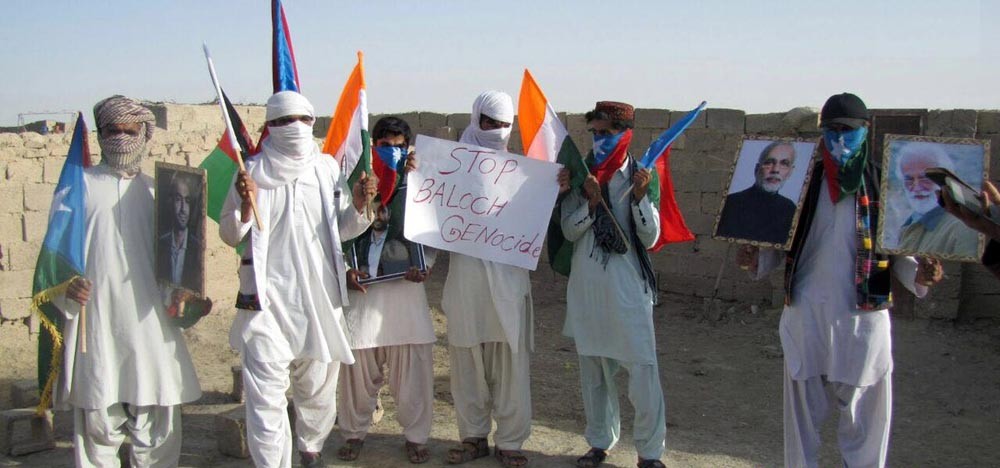
The sense in the province is that the grievances of the people of Balochistan must end and an opportunist like Modi must not be allowed to take advantage of the situation ever again

While Balochistan was still recovering from the shock of the bomb blast on August 8, it was mentioned in a speech by Indian Prime Minister Narendra Modi.
In an all-parties meeting earlier this month, Modi said that Pakistan has to "answer to the world for the atrocities committed by it against the people in Balochistan." In his Independence Day speech of August 15, Modi again mentioned Balochistan along with Gilgit, what he called Pakistan Occupied Kashmir, and said that people of these areas have thanked him for raising voice against the atrocities in Pakistan.
This statement of Modi was a fundamental shift in the policy of India because it was the first time Balochistan was brought up by India as a counter-argument for Kashmir.
As expected, the statement of Modi was condemned by the Pakistan foreign Office. It was termed as a desperate tactic to divert the world attention from the grim tragedy that has been unfolding in the Indian Occupied Kashmir (IOK).
The statement of Prime Minister Modi, who has a questionable human rights record in Gujarat, was also criticised by some leaders of the Congress, including former Minister for External Affairs, Salman Khurshid.
However, a stronger reaction came from the Balochistan government, which not only condemned the statement of Modi but also encouraged and endorsed the rallies in Balochistan on August 19 to protest against Modi’s statement.
Balochistan Chief Minister, Nawab Sanaullah Khan Zehri, termed the anti-India rallies a referendum against the so-called independence movement and the statement of Modi.
Modi’s statement, however, found support among the exiled Baloch leaders, including Brahamdagh Bugti, Hyrbyair Marri and Karima Baloch. All three of them were booked for treason in a police station in Balochistan for supporting the statement of Prime Minister Modi.
Read also: World’s view on Kashmir
The statement from Modi not only stained the already tense relations between the two countries, it also brought Balochistan in the limelight at the international level.
Former Senator, Sanaullah Baloch, of Balochistan National Party (BNP) believes that Modi’s statement should serve as an eye-opener that mishandling of Balochistan, particularly in the last 10 years, has brought it to this stage.
"We don’t care what Modi and his team has said. Our concern is that Balochistan is in a full-fledged national crisis and needs a sober debate, and not a military or security centric approach," says the former senator.
Malik Siraj Akbar, journalist and currently President of Balochistan Institute, tells TNS, "Modi has only asked the Pakistani government to look at the state of human rights in Balochistan. He has only taken advantage of an unresolved problem in order to embarrass Pakistan. I don’t think Modi, just like some American Congressmen who convened a hearing on Balochistan, is in love with the Baloch people."
Akbar believes Modi’s statements will benefit the Baloch nationalist movement overseas in terms of internationalising the conflict but it will have adverse affect on the domestic front.
Anwaar ul Haq Kakar, Spokesperson of the Balochistan government, however, does not agree with the assertions of Akbar.
"The statement of Prime Minister Modi is actually a confessional statement by India for interfering and playing havoc in Balochistan by creating terrorist outfits to challenge the writ of the state for the last many years," Kakar tells TNS.
He says India seems to have decided that it will use terror "as a strategic weapon of choice against unarmed populous of the province and the rest of Pakistan."
Likewise, Jan Achakzai, senior analyst who recently joined PML-N, believes the speech of Prime Minister Modi has raised the place of Balochistan in the Indian narrative and proxy warfare.
"Pakistan’s policy position that India is destabilising the country via Balochistan is vindicated once more," he tells TNS.
He alleges that the "appointment of new RAW Chief Arjun, who visited Balochistan several times and spent years in Afghanistan, has a message for Pakistan: be ready for more proxy "shock and awe".
Analysts agree that Modi brought up Balochistan as a counter-balance to Pakistan’s repeated statements condemning Indian tactics against Kashmiri protestors. However, it’s not logical to compare the Kashmir issue with Balochistan. Kashmir is a bi-partisan conflict between India and Pakistan endorsed by the United Nations whereas Balochistan is an internal issue of Pakistan created due to deprivation of local people of Balochistan and aggravated by mismanagement of successive federal governments.
The debate generated by Modi’s speech coincides with the 10th anniversary of assassination of Nawab Akbar Bugti on August 26, 2006. This means that the Balochistan conflict still lives on after a decade.
A most sane approach at this time vis-à-vis Balochistan would be to convert the attack of Modi into an opportunity to start serious efforts to resolve the conflict on a permanent basis.
It’s an undeniable fact that Balochistan has been deprived of its due share since 1947 and that needs to be compensated. The 18th Amendment and 7th NFC Awards were good steps in this regard during the PPP regime. Rather than taking the steps of the PPP regime one step ahead, the ruling PML-N has done nothing for Balochistan, except doing power politics through the Murree Accord.
The need of the hour is to end the grievances of the people of Balochistan and not allow an opportunist like Modi to take advantage of the situation ever again.